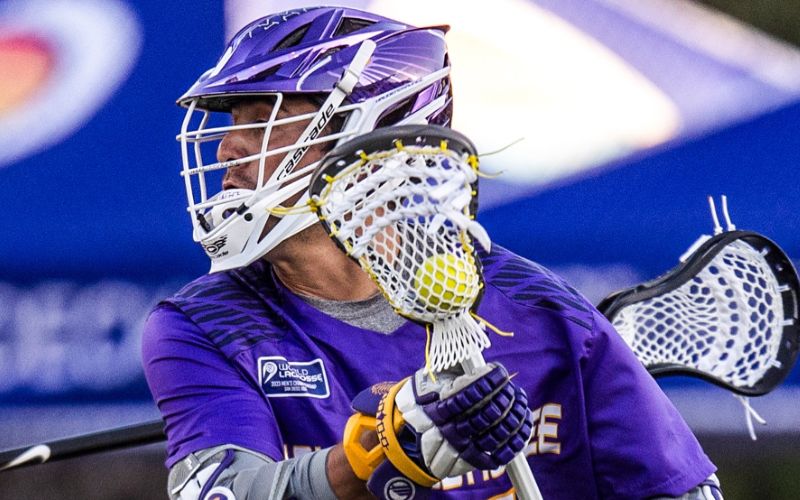
- Details
- By Jenna Kunze
At the White House Tribal Summit this month, President Joe Biden voiced his support for The Haudenosaunee National Lacrosse teams to compete in the upcoming 2028 Olympics under their own flag, in a show of support for tribal sovereignty.
In October, The International Olympic Committee voted to add lacrosse to the 2028 Olympic games in Los Angeles, California (LA28), for the first time in more than a century.
 Make A Donation Here
Make A Donation Here
The Haudenosaunee—a confederacy of six nations between the United States and Canada, including Mohawk, Oneida, Onondaga, Cayuga and Seneca, and Tuscarora—invented lacrosse and remain competitive at it on a world stage.
The Haudenosaunee Nationals men’s team ranks third in the world behind the United States and Canada in outdoor (and second indoor), and took home the bronze medal at the men's World Lacrosse Championships in June. The women’s team is ranked eighth globally and won gold at the Pan-American Lacrosse Association tournament in Jamaica in November.
“Their ancestors invented the game,” Biden said to a room full of Tribal delegates and members of Congress in Washington D.C. on Dec. 7. “They perfected it for a millennia. Their circumstances are unique, and they should be granted an exception to field their own team at the Olympics.”
Rex Lyons (Onondaga) is a former player for the then-Iroquois Nationals (the team changed its name in 2022 because Iroquois is a derogatory term the French called the Haudenosaunee) and a sitting board member for the Haudenosaunee Nationals Lacrosse Organization. He was on the inaugural team in 1983. Lyons told Native News Online that the Haudenosaunee are the “best ambassadors” for the sport of lacrosse.
“It's not like we don't belong there,” Lyons said. “And not only that, it’s our game. We are the originators. It’s a medicine game.”
For men and women Haudenosaunee lacrosse players, the ability to compete at the Olympics under their own flag would mean representation, liberation, and honor.
“For me personally, it would be a true honor,” said 31-year-old Mohawk player, Randy Staats. “It’s all the best words you could possibly think of, rolled up into one, to be able to put on that jersey and go side by side with all the other countries in the world. It’s not only representing my family and my people, but other Native people. It gives them hope and change for treaties that they have with their government.”
Casandra “Bean” Minerd (Onondaga), a 28-year-old member of the Haudenosaunee National women’s team, told Native News Online that competing as a sovereign nation in the Olympics would create an opportunity for global education. As an Indigenous woman, she said she’s used to debunking myths and defending her existence.
“Us going to the Olympics would be an opportunity for education, where we’re not going to be fighting as much to prove who we are…and that we’re not extinct,”Minerd said. “I know that when that time comes, and we're walking out with our flag and wearing our gear with Haudenosaunee across our chest, I'll be sobbing the whole time because it’s just so huge. It’s bigger than myself. We’re giving the opportunity to kids thinking they can work towards becoming an Olympic athlete.”
More Stories Like This
Two Indigenous Group Exhibits Opening January 9, 2026 at WatermarkWatermark Art Center to Host “Minwaajimowinan — Good Stories” Exhibition
Museums Alaska Awards More Than $200,000 to 12 Cultural Organizations Statewide
Zuni Youth Enrichment Project Takes Top Emerging Artist Apprentices to Phoenix for Artistic Exploration and Cultural Immersion
From Dishwasher to Award-Winning Chef: Laguna Pueblo's Josh Aragon Serves Up Albuquerque's Best Green Chile Stew
Help us defend tribal sovereignty.
At Native News Online, our mission is rooted in telling the stories that strengthen sovereignty and uplift Indigenous voices — not just at year’s end, but every single day.
Because of your generosity last year, we were able to keep our reporters on the ground in tribal communities, at national gatherings and in the halls of Congress — covering the issues that matter most to Indian Country: sovereignty, culture, education, health and economic opportunity.
That support sustained us through a tough year in 2025. Now, as we look to the year ahead, we need your help right now to ensure warrior journalism remains strong — reporting that defends tribal sovereignty, amplifies Native truth, and holds power accountable.
 The stakes couldn't be higher. Your support keeps Native voices heard, Native stories told and Native sovereignty defended.
The stakes couldn't be higher. Your support keeps Native voices heard, Native stories told and Native sovereignty defended.
Stand with Warrior Journalism today.
Levi Rickert (Potawatomi), Editor & Publisher

